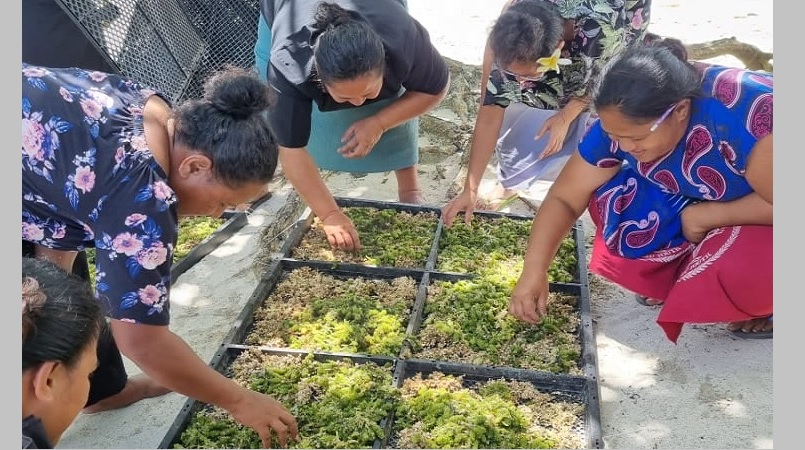
Twenty villages in Samoa will be used to start off a Seaweed Project that is aimed at helping communities grapple with the socio-economic effects of the COVID-19 pandemic.
Ten villages on Savai’i and another ten on Upolu will be used as pilot sites to cultivate and harvest the local delicacy known as limu or sea grapes.
Funded by the Government of Japan, this particular portion focusing on the production and expansion of limu, is worth about USD 320,000. It is being implemented by the United Nations Development Programme (UNDP) in collaboration with the Ministry of Agriculture and Fisheries (MAF).
“This project takes a multi-faceted approach. Firstly, limu is one of those commodities that has been recommended as an adaptive mechanism for continuous supply of seafood in the face of climate change. It is one commodity that can continuously be cultured so that we can have a constant supply of seafood,” said Magele Etuati Ropeti, Assistant Chief Executive Officer, Fisheries Division, MAF.
“Secondly, in this day and age of COVID-19, this is a project that focuses on the economic side, especially for families to engage themselves in culturing the limu and harvesting it themselves. So it can be a source of income generating activity not only for the community at the village level but we envisage to also involve households as well, whoever is interested in this.”
The expansion of limu is targeted as a niche commodity with income-generating potential to accelerate COVID-19 socio-economic recovery across coastal villages on the two main islands. The Limu Project seeks to expand production in existing sites whilst also identifying additional sites for limu harvesting. In terms of production, the project contributes to the expansion and construction of hatchery facilities to accommodate for the production of cultured biomass for distribution at the MAF Marine Mariculture Centre at Toloa.
The limu to be cultured is sourced from villages like Faga that are rich in this resource and that harvest it regularly. This means the money stays in the village and directly impacts the livelihoods of local communities.
“This activity seeks to strengthen the capacity at community level for sustainable and sustained production of limu to meet local demand as a key result. This will also be an entry point for piloting semi-commercial aquaculture systems and post-harvesting techniques that overcome short shelf-life limitations, providing the basis to test its potential for export commercialization,” said Christina Mualia, Assistant Resident Representative for Governance and Poverty Reduction, UNDP.
The inception workshop for the Limu Project was held earlier this week in Savaii and involved representatives from the 10 villages that the project will be implemented in.
“We are very much looking forward to this seaweed project because we already know the potential it offers not only in terms of the health benefits of limu itself, but the income-generation for our village especially for the women and youths who are without jobs. We welcome this initiative and we thank the Governments of Samoa and Japan, UNDP and all those involved in this project for such a wonderful and much-needed initiative,” said Tuileutu Alaivaa Voi, mayor for the sub-village of Lu’ua in Faga, the first village where the project has been rolled out.
The Sea Weed Project falls under the overarching COVID-19 Preparedness and Recovery: Diversification of the Economic Sector in Samoa (CPRDESS) Project, which aims to create business opportunities and income-generating activities for the community.
Sea grapes (Caulerpa racemosa), or limu, are a favourite local delicacy that have been enjoyed by many throughout the generations. It’s a type of edible seaweed that generally grows in shallow water and clear, reef environments and is rich in iron and potassium. It has multiple health benefits both as a food and medical item, but also for cosmetics.
Photo supplied
